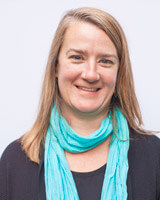 Jill Heiney-Smith’s passion for the Going to College in the Fifth Grade program — in which elementary school students from Dearborn Park Elementary School get a taste of college life — derives in part from her first visit to SPU’s campus as a high school sophomore. “I vowed to attend college at SPU if I could,” she said. “I entered in 1989 with the unusual clarity that I would become a secondary English teacher, and I never waivered.”
Jill Heiney-Smith’s passion for the Going to College in the Fifth Grade program — in which elementary school students from Dearborn Park Elementary School get a taste of college life — derives in part from her first visit to SPU’s campus as a high school sophomore. “I vowed to attend college at SPU if I could,” she said. “I entered in 1989 with the unusual clarity that I would become a secondary English teacher, and I never waivered.”
But beyond understanding the effect early college visits can have on students, Heiney-Smith also has a long-held interest in serving highly impacted communities. Here is how she describes her journey.
What early experiences shaped your educational interests?
“Teaching was in my genes — my grandmother was an elementary teacher in urban Washington, D.C., and my mother taught music. However, my commitments were most shaped by watching my brother, who is African-American and Korean-American, navigate the school system with strikingly different results than his four white siblings. I wondered, with all of the same teachers, opportunities at home, parental support and advocacy, why did he struggle to find success in school?
“These questions grounded my desire to teach in a high-poverty, culturally diverse setting. I requested this type of placement for my internship but learned that while one may have a desire to serve, this doesn’t mean one has the skills or preparation to do so.
“Building these skills has been at the heart of my vocational journey, and is still my deepest commitment. I learn more every day about how to be a compassionate, self-aware, and socially just educator, and how to model this for my students.”
Can you tell us about the journey from these early teaching experiences to your current position at SPU, which allows you to place student teachers in their first positions within various school systems?
“After teaching in rural and urban schools for about six years and attending graduate school, I took some time off to be home with my children. Then a former teaching friend told me about an opportunity to be a university supervisor for pre-service teachers at the University of Washington.
“I began working there in 1994 and had a wonderful 10 years of service, during which I learned a great deal about the craft of teaching, the complexities of university/school partnerships, and various models of teacher education. Additionally, I had the opportunity to work with many renowned scholars and thought leaders.
“Now, as the new director of field placements and professional partnerships, I am working with a wonderful team of professionals to develop more comprehensive systems of support for mentor teachers in our partner schools, as well as for our SPU field supervisors. I am privileged to teach courses in all of our teacher education programs, which really helps me understand how to bring coherence to our coursework and fieldwork.”
What is it like returning to SPU as an employee?
“I had not been on the SPU campus for many years, but when I visited for a conference in 2013, it immediately felt like home. While the upper campus looked very different, the palpable feeling of community was still the same.
“Now I can explore questions of equity and justice from a perspective of faith and service within the Christian tradition. I am blessed to have found several mentors already, as I explore what this means for the preparation of new teachers studying here at SPU.
“I received an outstanding education at SPU. I learned how to interrogate ideas, and how to serve my community in ways that are authentic to me and my faith. I also developed lifelong friendships that still sustain me today. I feel honored to return to my alma mater in my current capacity, and hope to pay back some of the gifts that were granted me so many years ago as a student.”